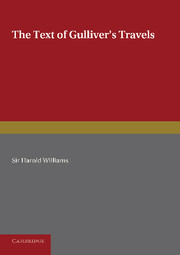III - Swift's Autograph Corrections of the Miscellanies, 1727-31
Published online by Cambridge University Press: 05 June 2016
Summary
The publication of miscellany volumes, containing contributions in verse, or in prose, or in both, by two, three, or more authors, began early, not so many years after the invention of printing, and has continued into our own day. The use of the word ‘miscellany’ is no longer, apparently, much in favour; and the sixteenth century chose happier titles. Could we but now select from the publishers' lists a new Handefull of pleasant delites or The Paradise of Daintie Devises or Englands Helicon, how much greater our expectancy when the book arrived and we began to turn its pages! The gift for inventing these and the like titles passed with the end of the century, and “we come to less imaginative descriptions. The seventeenth century was peculiarly rich in votive volumes, Funebria Sacra, or Lacrymae; thence we pass, by contrast, to Wits Recreations, or Merry Drollery and, towards the end of the century we come upon the uninformative A Collection of Poems by Several Hands; and a little later came Miscellany Poems, the first of the six collections, 1684-1709, commonly known as Dryden's, or otherwise Tonson's, Miscellanies. The pattern and the title came into being together; and in the first half of the eighteenth century the words ‘miscellany’, ‘miscellanies', or ‘ miscellaneous' are of constant recurrence. In the first fifty years of the century generalized collections approximately matched in number those of the preceding two centuries.
The student of the earlier part of the eighteenth century will soon become aware of the important part played during this period by the many miscellany volumes published. Leading poets of the time made their first appearance in print in one or other of these collections. It has been said, and rightly, that ‘ a knowledge of the more important miscellanies of the period is essential to any one who is to attempt to edit an eighteenth-century poet, and to establish the canon of his work’. It is no part of my duty to comment further on these miscellanies in general. They vary in the quality of their content; but there are few in which we shall not find a poem or two by an anonymous or forgotten writer which will amply reward us for pages of indifferent verse.
- Type
- Chapter
- Information
- The Text of Gulliver's Travels , pp. 62 - 94Publisher: Cambridge University PressPrint publication year: 2013

